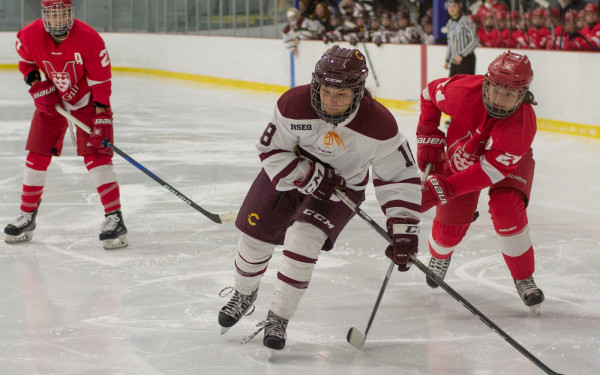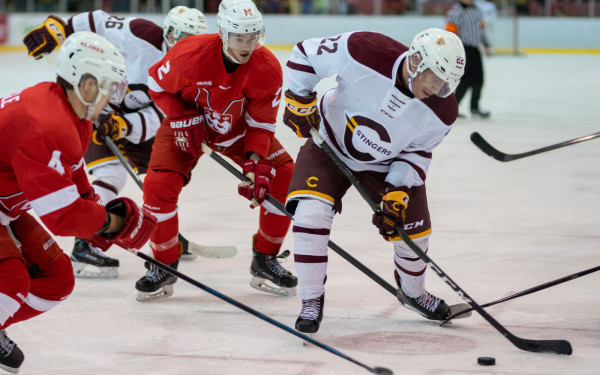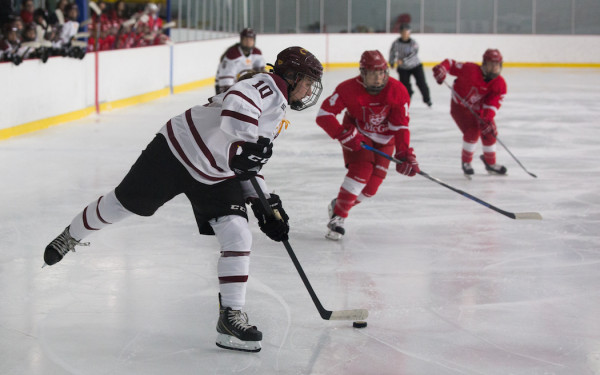Montreal Hosts Global Roller Derby Championships
The Montreal Roller Derby Scene Is on a Roll After Hosting the World Championships
Tattoos poking out beneath fishnet stockings, flashy helmets plastered with stickers, stands selling rainbows of roller skates—on this afternoon, the Claude Robillard Sports Complex is jam-packed with a diverse crowd.
From the arena rises heated cheers and energetic chants, reactions to the crashes and smashes on the roller derby track below.
Young children, supportive parents, university students, and curious grandparents from around the world gathered in Montreal to take in the second day of the international roller derby championships.
This event, in which the top ten teams in the world are competing, marks the grand finale of the roller derby season, explained Women’s Flat Track Derby Association marketing officer Heather Link.
Montreal is welcoming teams from not only North America but from around the globe, including Australia and Argentina.
“They’ve been amazing hosts; this event is running so wonderfully. It’s nice to see the turnout, […] people from all over the world are travelling here to experience roller derby in person,” said Link.
Montreal Roller Derby is the first league outside of the US to host an international championship.
“[It’s] something that we’re really proud of as a league because it’s always been in the States, which has barriers for [Canadians] to travel to,” said Renée Labrosse, co-captain of New Skids on the Block, the Montreal Roller Derby A-level travel team.
Founded in 2006, Montreal Roller Derby was the first roller derby league in Canada. Made up of two travel teams, three local teams, and one rookie team, it was also the first Canadian team to join the WFTDA. New Skids on the Block compete at the international level in this.
“Our team [is] really lucky that the league hasn’t asked us to step up and volunteer a lot,” explained Labrosse. “They’ve supported us to continue training, so we can do the best we can while they’re all here putting in hours and hours of work for months to make this go smoothly.”
Caroline Poudrier, secretary of the board of directors, head of fundraising, and media liaison for the tournament, explained that because the sport is so young, it’s still in a very DIY stage. “There isn’t much time for anything else. […] You’re either playing, practicing, [or] fundraising; […] you’re always doing something.”
As Labrosse puts it, it’s very grassroots. The players work to fund the league, dedicating hours and hours of volunteer work. “It’s like having another job. It’s very labour-intensive.”
“I think most [players] arrange their life to fit with derby. […] It does take a lot of adjustments,” said Nadia Gregoire, a player on B-travel team The Sexpos. Poudrier explained there is a running joke in the roller derby community about having friends outside of the sport.
But it’s exactly this sense of community that the players live for.
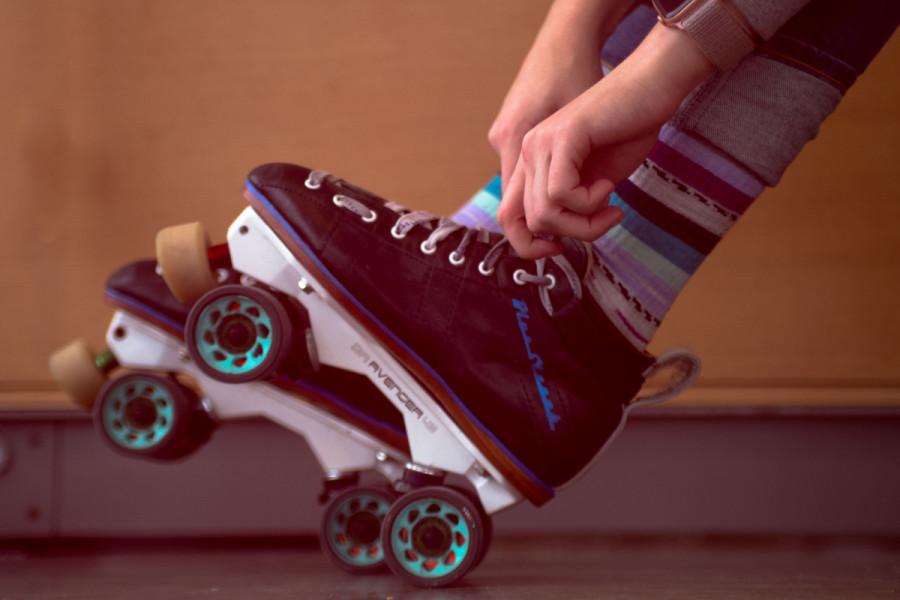
Yuna Guivarc’h, a player on New Skids on the Block who had previously played only individual sports, explained that the idea of team spirit drew her to derby.
“As much as I love gymnastics and martial arts and everything, I have really come to appreciate working with teammates, […] suffering with someone and playing against another team and having that support all around.”
However, as Poudrier explained, the support and team spirit extend far beyond the local market.
“It’s a worldwide community. One time I was in New York at Mermaid Parade on Coney Island, […] and I saw this girl with roller skates on her arm. I was like ‘Oh! Roller derby!’ and she’s like, ‘Yeah! I play for Gotham on the home team!’” recalled Poudrier.
She remembers an instant connection being forged.
Mutual support is something that comes naturally to the people of roller derby, explained Poudrier.
Because of financial hardship due to an economic crisis in their country, the Argentinian team was having a difficult time fundraising for the playoffs.
Poudrier explained the global roller derby community came together and collectively raised $17,000. Because of this, the team was able to make the tournament.
The strong sense of community is only one of many attributes of the sport that captivates players.
“I like the physicality of the sport. […] You need to have a lot of different strengths to play it, like cardio [and] agility,” said Gregoire. “I also like […] the values of inclusivity.”
Poudrier, in addition to her volunteer work, finds time to play as well.
Signs You Might Be Playing Roller Derby
- There is a flat oval track, slightly
lopsided to mimic a bank.
-Each game is held in thirty-minute halves, made up of plays (jams) lasting up to two minutes.
- The jam has five skaters on the track. (one= jammer distinguished by a star on their helmet, other four= blockers.)
- The jammer has started skating behind you if you’re a blocker.
-You’ve been hit by another player but they only used parts of the body below the neck, above the elbows, and above the knees.
“You’re the only instrument. There’s no stick, there’s nothing to grab. It’s just you against the other people. […] It’s very empowering.”
— Caroline Poudrier
She skates for the MTLRD home team Les Filles du Roi and participates in the men’s league.
For her, she explained, exercise is therapy.
“I was not in a good time in my life. […] I was depressed and looking for some direction,” recalled Poudrier.
“I had a lot of aggressivity because I had a lot of conflict in this time of my life. […] I wanted something physical and I remembered that one of my friends told me years ago that I should try roller derby.” A boot camp was starting, so she geared up and started playing. She immediately found the sport’s physicality exhilarating.
“You’re the only instrument. There’s no stick, there’s nothing to grab. It’s just you against the other people. […] It’s very empowering,” explained Poudrier.
“It just brings you out of your shell,” said Link, who used to play for Springfield Roller Derby in Springfield, Missouri. She explained the roller derby’s values of inclusivity and acceptance allowed her to build up her self-confidence.
“You have this community where otherness is not only tolerated but embraced with a lot of love. […] It’s this amazingness of having the ease of just being,” said Poudrier.
As the WFTDA states in its gender policy, it is committed to including and not discriminating against anyone who identifies as female. This includes transgender women, intersex women, and gender-expansive participants.
“We only care about who the people are, no matter what bits they’re carrying,” explained Poudrier. Though men, and those identifying as male, cannot play in the league, they may coach.
Despite roller derby being female-dominated, Jeff Post, one of The Sexpos’ coaches, feels fully accepted by the team. Better known as The Rev, or simply Rev, Post explained that because of the roller derby community is so accepting and open-minded, gender discrimination is not as prevalent in roller derby as it is in other sports.
“If you look at professional football teams, […] it’s like, ‘Oh, they have their first female coach.’ Well, of course they do, because they’re trying to make everything all-inclusive now, but they make a big controversy about it because it’s a male-dominated sport,” explained Post.
Post explained the roller derby community is made up of an incredibly diverse crowd of people of all backgrounds, genders, cultures, and sexualities.
“It’s one of these kind of all-inclusive sports where you can really help develop not only female skaters, but trans players and bisexual [and] gay players that don’t feel like they are going to fit in in any other kind of sport.”
Poudrier feels that, these days, being a straight woman in roller derby has become the exception. “When I tell people that I play roller derby, they’re like, ‘Isn’t that a gay sport?’” said Poudrier. “But there’s no such thing as a gay sport![…] It’s a sport where you can be gay and it doesn’t matter; […] you’re more than accepted—you’re embraced.”
Poudrier explained that this value of diversity goes hand in hand with the sport’s relatively recent rebirth.
Modern derby has its roots in Texas, explained Poudrier. She explained that a big event was set to take place, but then the organizers had a fallout with the players and called off the tournament.
The players were angry, explained Poudrier, and decided to host the event themselves.
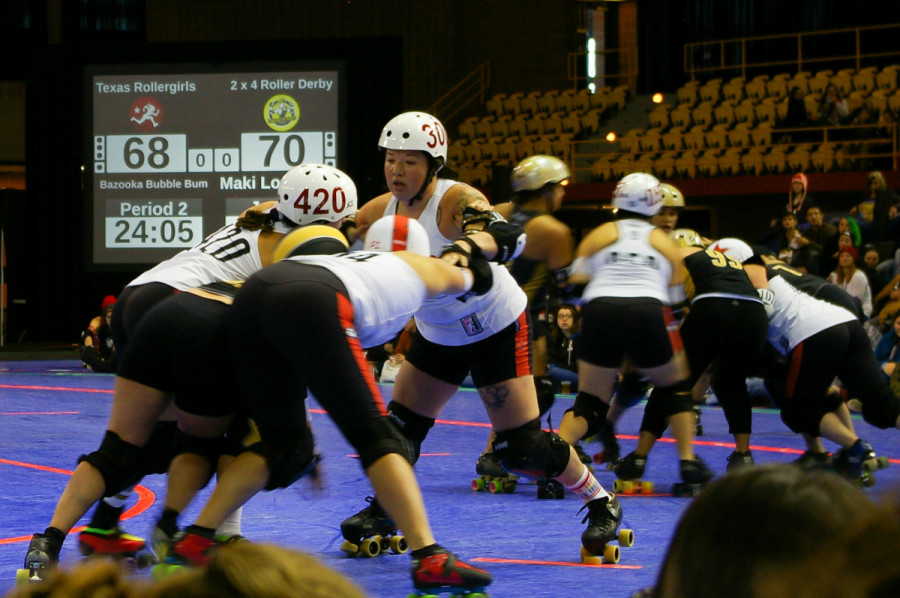
“It drew this crowd of people who never played sports,” explained Poudrier. “It brought in the queer community, outcasts, punk and rockabilly people, tattooed people.”
Poudrier explained that because the modern version of the sport is so young, there aren’t stereotypes surrounding it yet, making it a free-for-all in terms of self-expression.
“We’re still building this community; […] it’s moving and it’s evolving,” said Poudrier, who is full of hope and excitement about the future of roller derby. “We just need to continue down this path,” said Gregoire.
“It would be awesome if we could [host the championship] another year.”
Guivarc’h agreed, saying she loves having friends and family able to come out to support her without having to travel long distances.
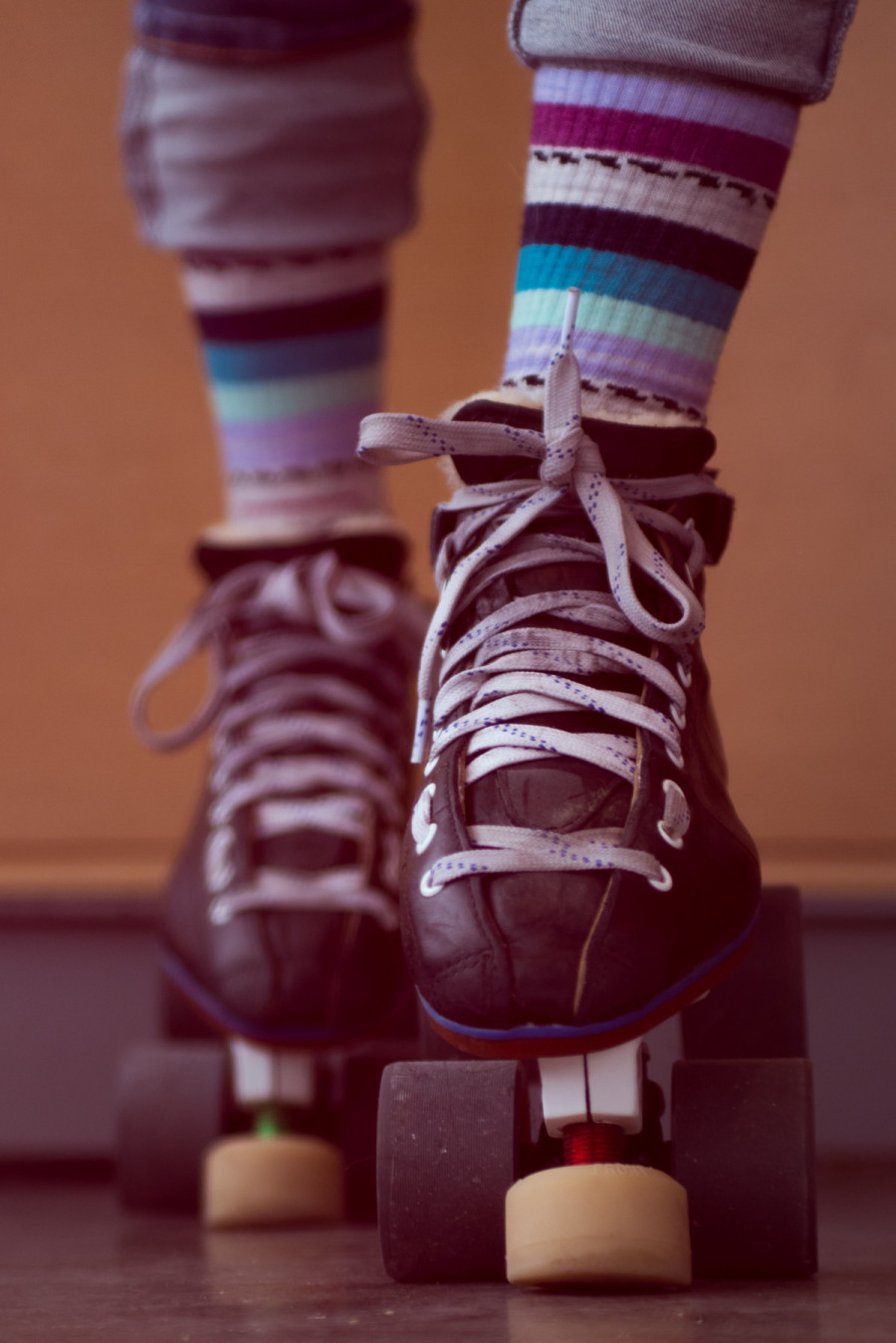
As for her team’s future goals, Guivarc’h said, “[New Skids on the Block] want to pierce the top five, so we try to have a several-year plan to do that.” Guivarc’h explained that though the A-team is currently quite strong, they are focusing on building powerful skaters in the B-team to have the best possible group.
“We can really help develop players and help them grow starting at the B-level so that we can give them that jumping off point […] to get into the A-level,” explained Post.
For anyone interested in trying out the sport, bootcamps are held by the MTLRD every fall.
People pay a fee to attend and learn the skills the players are working on, explained Labrosse, who said the intake of new players was huge this year. “There was a ton of skaters that were keen to learn how to play. […] Montreal has such a vibrant community interested in roller derby.”
The bootcamps are open to anyone 18 and up, regardless of gender, and require no former roller skating experience. Keep an eye out next September on MTLRD’s Facebook page (@mtlrollerderby) or check out their website (mtlrollerderby.com) to sign up and join the community.

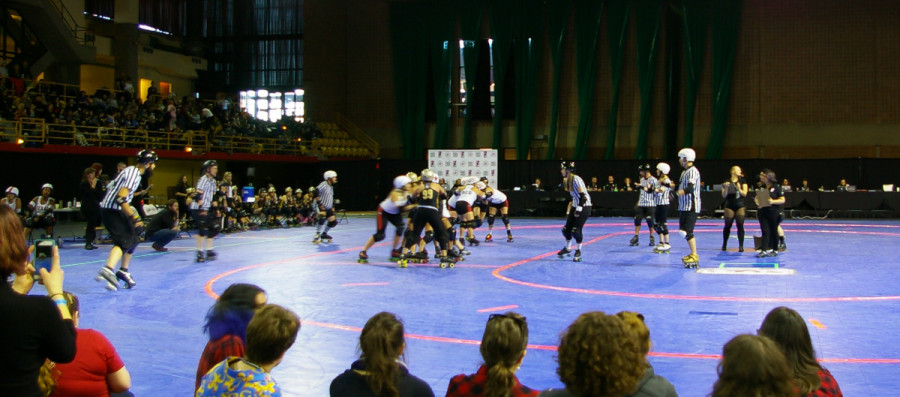
_600_832_s.png)

4_600_375_90_s_c1.jpg)
